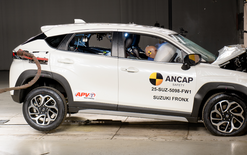Bill to kill CCD races through

The government has passed legislation repealing the clean car discount (CCD) for all vehicles registered after December 31, 2023, after an amendment bill raced through its three readings in parliament in a single day.
The Land Transport (Clean Vehicle Discount Scheme Repeal) Amendment Bill was introduced by the coalition to parliament on December 12.
It then passed the committee of the whole house stage and its trio of readings the following day and now just awaits the formality of royal assent to officially become law.
Simeon Brown, Minister of Transport, says the government had made scrapping the “ute tax” a priority of its 100-day plan and had now made good on that promise.
“The previous government’s scheme, which provided subsidies for people purchasing electric vehicles [EVs] while taxing hardworking farmers and tradies who have little choice about the type of vehicle they need for work, is inequitable and fiscally irresponsible,” he adds.
“Many drivers who need utes for work can’t avoid charges under the scheme as there are few viable alternatives that meet their needs.
“The scheme was supposed to be fiscally neutral, with the ‘ute tax’ charges covering the rebates and administration costs. However, more has been paid out in rebates than has been received in charges, and this is only set to get worse, with more taxpayer money likely needed to keep the scheme afloat.”
Brown, pictured, notes more than $579 million has been paid out in rebates and $13.5m spent in administration costs since the CCD was introduced in July 2021, with it becoming a full feebate programme in April the following year.
At the same time, only $290m has been collected in charges and Brown says this has left taxpayers facing a $302.5m deficit.
The repeal of the CCD applies to all vehicles registered from 11.59pm on December 31, 2023, and rebate applications will close at the same time.
Brown says the government aims to maintain the uptake of EV ownership by increasing charging infrastructure across the country.
“We will deliver a comprehensive, nationwide network of 10,000 public EV chargers by 2030, while considering robust cost/benefit analysis.”
‘Victory for choice’
The Act party, which had ditching the CCD among its election policies, says the passing of the bill is a “victory for choice, fairness and rational policymaking”.
Cameron Luxton, transport spokesman, says: “Scrapping this legislation was a commitment secured in Act’s coalition agreement with National, and we’re delighted to be part of a new government that trusts New Zealanders over politicians to decide which cars are best suited for our work, family and recreation.
“The ute tax was always virtue-signalling nonsense that punished farmers, tradies, and large families with higher costs amid a cost-of-living crisis. Meanwhile, the benefits fell on those buying shiny new Teslas and overseas carmakers.”
He claims the scheme wouldn’t have cut New Zealand’s overall emissions because those from transport are covered by the Emissions Trading Scheme (ETS).
“Incentives to switch from petrol or diesel to electric are already in place at the pump through ETS levies – currently around 16 cents on a litre of petrol.”
Opposition view
The Green Party was unhappy at the speed of the bill’s progress this week and labelled the scrapping of the CCD as “an act of climate vandalism”.
Julie Anne Genter, the party’s transport spokesperson, says: “The clean car discount is the single most effective climate policy implemented by any government in New Zealand so far.
“It has prevented two megatonnes of climate pollution entering the atmosphere, led to cleaner air for people to breathe, and saved people thousands of dollars on fuel.”
She says the feebates regime is as close to an ideal government policy intervention as you can get and notes 60 per cent of all new cars sold in August this year were electric or hybrid.
“The clean car discount was designed in a way that meant people were working together to be part of the solution to climate change,” adds Genter.
“It has been estimated that National’s decision to get rid of the clean car discount could result in 100,000 fewer electric vehicles on the road by 2030. This would increase carbon emissions by around 900,000 tonnes.”
Tangi Utikere, Labour’s transport spokesman, says the government “ramming” the repeal of the CCD through parliament under urgency has denied New Zealanders the chance to have their say about how this might affect them.





